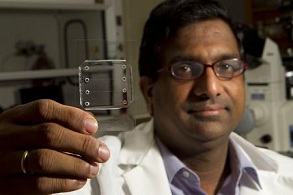Imagine that you are a patient who has symptoms of a life-threatening disease such as cancer or a stroke. Typically, your doctor would have to take blood samples and send them to a lab, which means you would have to wait a week or more for the results. But what if you could get the results within 15 minutes right there in the office?
A new technology has been developed that can do just that.
 Called the SpinDx, Sandia National Laboratories has created a portable rapid diagnostic system that can analyze blood samples for a variety of conditions. In just 15 minutes, clinicians can detect heart attacks, strokes, infections, cancers and other afflictions. The team is currently looking for industry partners to license and commercialize the product. Several companies have already expressed an interest.
Called the SpinDx, Sandia National Laboratories has created a portable rapid diagnostic system that can analyze blood samples for a variety of conditions. In just 15 minutes, clinicians can detect heart attacks, strokes, infections, cancers and other afflictions. The team is currently looking for industry partners to license and commercialize the product. Several companies have already expressed an interest.
The small device works like a CD player. The technician takes a droplet of blood, typically from the fingertip, and places it onto a cartridge, which is the size of a CD. The disc is then spun on the "lab-on-a-disk" platform, and the centrifugal force separates the blood's proteins for diagnosis. The device uses a high-speed camera to watch how the blood samples behave within the notches of the disc. SpinDx can determine a patient's white blood cell count, analyze protein markers and process up to 64 assays. As the technology is developed further, researchers plan to provide different discs for specific ailments. SpinDx will have a variety of applications. Besides detecting illnesses, the device can additionally be used for homeland security and food safety.
The company recently led a National Institutes of Health grant to adapt the device for toxin diagnostics. SpinDx has been proven to detect botulinum, a toxin caused by the bacteria Clostridium botulinum. A small quantity of this bacteria added to the food supply can be lethal. About 145 cases of botulism are reported in the United States each year, according to the Centers for Disease Control and Prevention. Previously, laboratory mice were the only reliable way to test for botulism, but the SpinDx botulinum assay outperforms the mouse tests and can be an effective tool against bioterrorism. Similarly, SpinDx can spot toxins at a food processing plant. Fifteen percent of botulism cases are food-borne. The device has been designed to handle thick, viscous food substances to detect all kinds of toxins such as e.coli or salmonella. The researchers also plan to develop a device that can be used in the field by emergency responders.
While there are many diagnostic tools available, SpinDx is small, fast and inexpensive. The device operates on batteries and can run 20 to 30 tests a day and still operate for a full month. Sandia National Laboratories estimates it would cost just pennies to manufacture. The technology was developed with close to $3 million in taxpayer money. Sandia National Laboratories is operated by Sandia Corporation, a wholly-owned subsidiary of Lockheed Martin Company for the U.S. Department of Energy's National Nuclear Security Administration, with facilities in Albuquerque, New Mexico and Livermore, California.
Lara Mossa Stump
and
Hulet Smith, OT